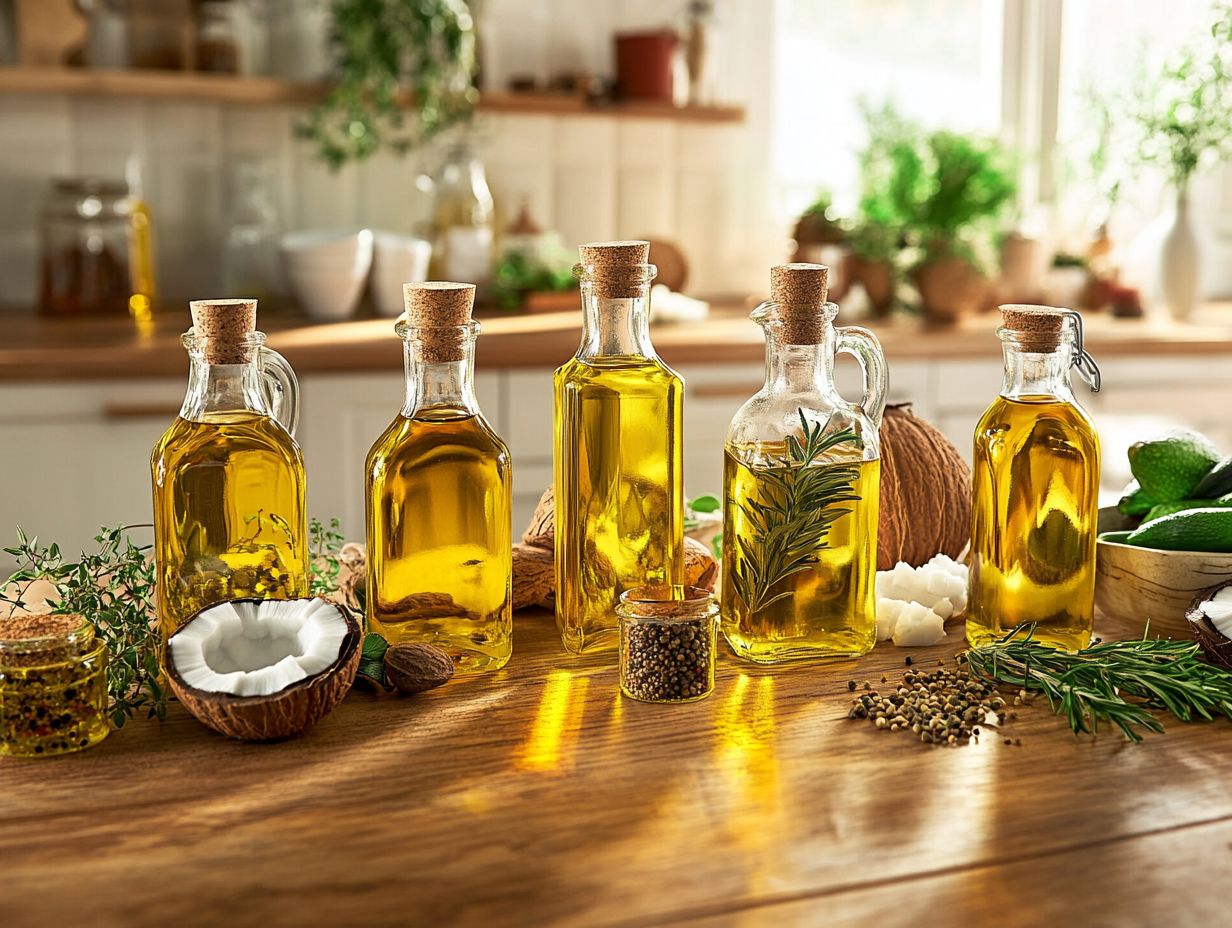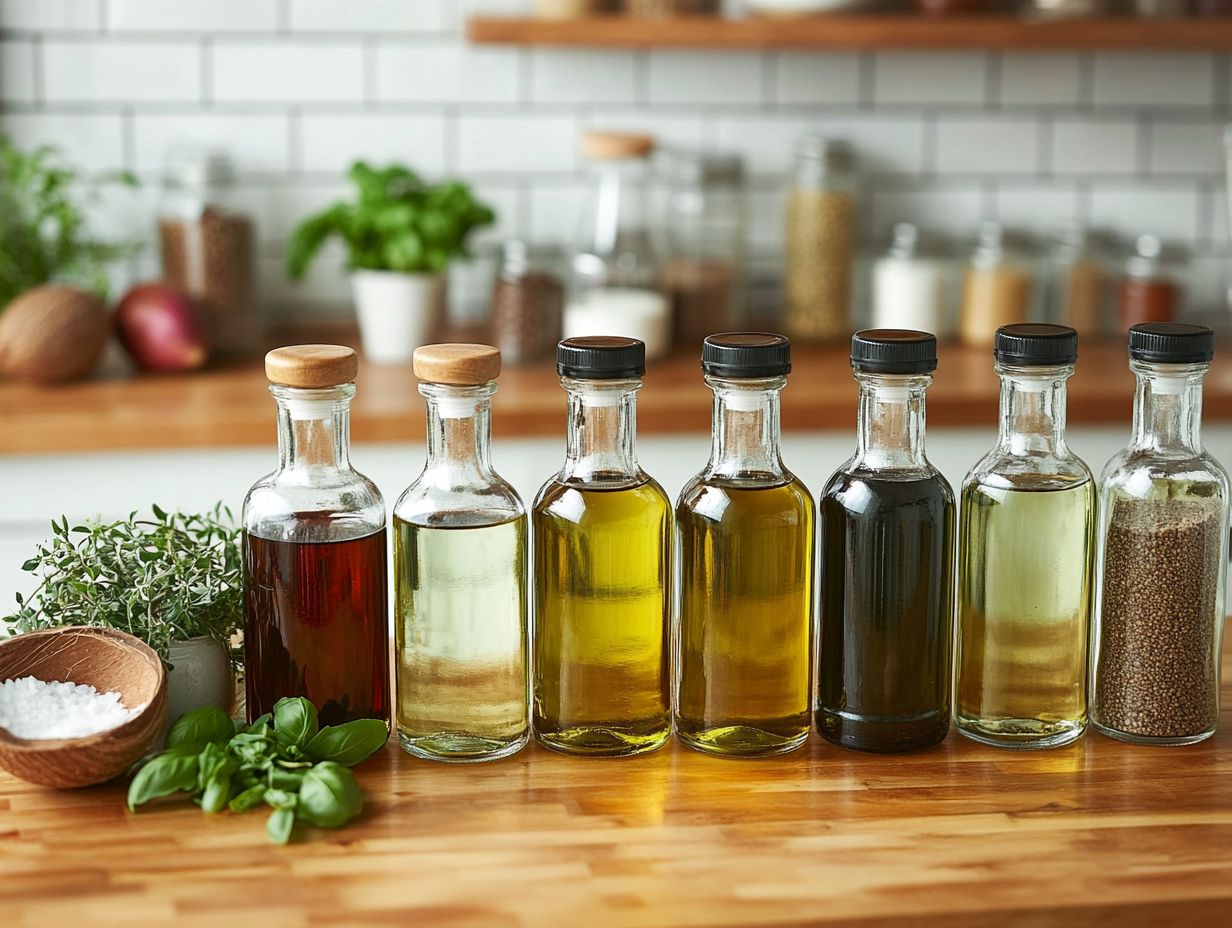How to Choose the Best Cooking Oils?
Choosing the right cooking oil can elevate your meals and enrich their nutritional profile. With an overwhelming array of options at your disposal, it’s vital to grasp the distinct types, their applications, and their health impacts.
This guide delves into the world of cooking oils, spotlighting their smoke points, nutritional advantages, and pitfalls to avoid. From uncovering the healthiest oils that are rich in beneficial fats to identifying suitable substitutes for various cooking techniques, you’ll acquire the insights necessary to make informed decisions in your culinary endeavors.
Contents
Key Takeaways:

- Opt for cooking oils with high smoke points for frying. Look for oils rich in nutrients to boost your health!
- Consider the amount of saturated and trans fats in cooking oils when making choices for a healthier diet.
- Explore alternative options such as coconut oil, avocado oil, and ghee for different cooking methods to switch up your oil intake and add variety to your meals.
Understanding Cooking Oils
Understanding cooking oils is essential for you as a cooking lover. These oils elevate the flavor profile of your dishes and significantly impact your health.
From olive oil to avocado oil, each variety boasts unique properties. They differ in smoke points and nutritional benefits.
Knowing the distinctions between healthy fats and unhealthy fats helps you make informed choices in your kitchen. The smoke point is the temperature at which oil begins to smoke and break down, affecting both flavor and health.
Furthermore, factors like oil processing and the presence of antioxidants can greatly influence your cooking and health outcomes. It’s important to familiarize yourself with the array of oils at your disposal.
Different Types and Uses
Cooking oils come in a delightful array, each with its own unique uses and health perks. For instance, extra virgin olive oil is a favorite thanks to its rich flavor and heart-healthy properties.
Canola oil is your go-to for high smoke points and versatility perfect for all your frying adventures.
Peanut oil is great for Asian cuisine. Its mildly nutty flavor and high smoke point make it an ideal companion for stir-frying and deep-frying.
Vegetable oil, often a blend of various oils, is celebrated for its neutral taste. It s a reliable choice for baking and saut ing without altering the original flavors of your dishes.
And let’s not overlook avocado oil. With its buttery taste and impressive smoke point, it excels in both high-heat cooking and as a finishing touch on salads.
Each of these oils elevates the flavor of your culinary creations and brings numerous health benefits, like promoting heart health and packing in rich antioxidants. They truly are versatile staples in any well-equipped kitchen.
Factors to Consider when Choosing Cooking Oils
When selecting cooking oils, several factors warrant your attention, including smoke point, nutritional value, and the quality of the oil’s processing. These elements can greatly impact both your health and the flavors in your dishes.
Understanding the smoke point is essential, especially for high-heat cooking methods. Overheating can lead to the creation of unhealthy fats and a loss of flavor.
Consider the nutritional value specifically the balance between healthy and unhealthy fats that determines how beneficial the oil is for your heart health and overall well-being.
Try incorporating these oils into your next meal for a health boost and incredible flavor!
Smoke Point and Nutritional Value

Understanding the smoke point of cooking oils is essential. It defines the maximum temperature at which the oil can be heated without breaking down and generating harmful compounds that could negatively impact your health.
This knowledge is particularly important when considering how different oils perform across various cooking methods, such as frying or saut ing. When selecting oils for high-heat techniques, prioritize those with higher smoke points like avocado or grapeseed oil, as they resist breakdown better.
Choose oils that can endure high temperatures and offer a healthy nutritional profile. Look for oils rich in healthy fats while minimizing unhealthy trans fats. By making informed choices about cooking oils, you can elevate both the safety and nutritional quality of your meals.
Healthiest Cooking Oils
When considering healthy cooking oils, prioritize those rich in beneficial fats like omega-3 fatty acids and monounsaturated fats. These oils enhance your culinary creations and play a significant role in promoting heart health and overall wellness.
Oils with High Levels of Healthy Fats
Discover how olive oil and avocado oil can transform your meals with their amazing health benefits! These oils are celebrated for their impressive amounts of healthy fats, particularly monounsaturated fats, which are vital for maintaining optimal heart health and nutritional balance.
These oils support cardiovascular wellness and help reduce inflammation and enhance brain function. Their versatility is remarkable; drizzle olive oil over salads or use it in marinades, while avocado oil shines in higher-heat cooking thanks to its elevated smoke point.
A 2020 study published in the ‘Journal of Nutrition’ underscores that regularly incorporating these oils into your diet can significantly lower the risk of heart disease. Experts suggest weaving these fats into your daily meals, whether saut ing vegetables or elevating the flavor of roasted dishes. Enjoy their myriad health benefits while indulging in diverse culinary delights!
Unhealthy Cooking Oils to Avoid
It’s important to recognize the unhealthy cooking oils that should be avoided. These oils typically harbor high levels of saturated and trans fats, which can adversely affect your heart health and overall well-being.
Prioritize healthier options to nurture both your body and your lifestyle.
Oils with High Levels of Saturated and Trans Fats

Avoid oils rich in saturated and trans fats, such as certain vegetable oils and margarine, to reduce health risks. These fats can elevate cholesterol levels, increasing your risk of heart disease and stroke, while also fueling inflammation and various chronic conditions. Common culprits include canola oil and palm oil, often found in processed foods and frequently used in cooking.
Making conscious choices about fats is essential for your overall wellness. Instead, embrace healthier options like olive oil, avocado oil, or coconut oil. These alternatives not only deliver richer flavors but also provide beneficial nutrients.
Opting for these oils can improve your heart health and elevate the quality of your meals, ensuring a more nutritious and enjoyable cooking experience.
Cooking Oil Substitutes
When it comes time to substitute cooking oils, a range of alternative options awaits your exploration. These choices can seamlessly integrate into various cooking methods, preserving both flavor and health benefits.
With the right substitutes, you can ensure that your dishes remain as delicious as they are nutritious. Make the switch today!
Alternative Options for Different Cooking Methods
Discover how the right oil can transform your meals into healthy delights! Choosing the right alternative oil for various cooking methods, like frying or low heat cooking, can elevate your dishes while maximizing health benefits.
It s crucial to consider the smoke point and nutritional value of different oils, especially when preparing meals that require higher temperatures. The smoke point is the temperature at which an oil starts to smoke, releasing harmful compounds and imparting a burnt taste to your food.
For frying, consider using avocado oil or coconut oil; both provide a stable cooking environment and rich flavor without the unwanted trans fats.
When saut ing, grapeseed oil is a fantastic choice it adds depth to your dishes while keeping them heart-healthy.
For salad dressings, a delightful blend of olive oil and lemon juice not only enhances flavor but also aligns beautifully with Mediterranean dietary principles, making it a nutritious addition to your fresh vegetables and greens.
Frequently Asked Questions
-
What factors should I consider when choosing the best cooking oils?
When choosing the best cooking oils, consider the smoke point, flavor, health benefits, and intended usage. Oils with high smoke points are best for high-heat cooking methods, while flavor and health benefits vary based on the oil type.
-
How do I determine the smoke point of a cooking oil?
-
The smoke point indicates the temperature at which an oil starts to smoke. To find this information, check the oil’s label or do a quick online search. Generally, oils with higher smoke points are better for high-heat cooking methods like frying and roasting.
-
What are the healthiest cooking oils to use?
-
The healthiest cooking oils are those high in monounsaturated and polyunsaturated fats, and low in saturated and trans fats. Examples include olive oil, avocado oil, canola oil, and grapeseed oil, which are linked to health benefits like reducing inflammation and improving heart health.
-
Can I use the same cooking oil for all types of cooking methods?
-
Choose oils based on your cooking method for the best results. For example, oils with high smoke points like canola or avocado oil are better for high-heat cooking, while oils with lower smoke points like olive or coconut oil are suited for low-heat methods like saut ing or dressings.
-
Are there any cooking oils to avoid?
-
Yes, certain cooking oils should be avoided due to their high levels of unhealthy fats and potential health risks. These include palm oil, vegetable oil, and shortening, which are often highly processed and may contain trans fats. Opt for healthier alternatives like olive oil or coconut oil.
-
How should I store my cooking oils?
-
Store cooking oils in a cool, dark place away from heat and light to prevent them from going rancid. Keep lids tightly sealed to prevent air and moisture from entering. Some oils, such as olive oil, can also be stored in the refrigerator to extend their shelf life.







